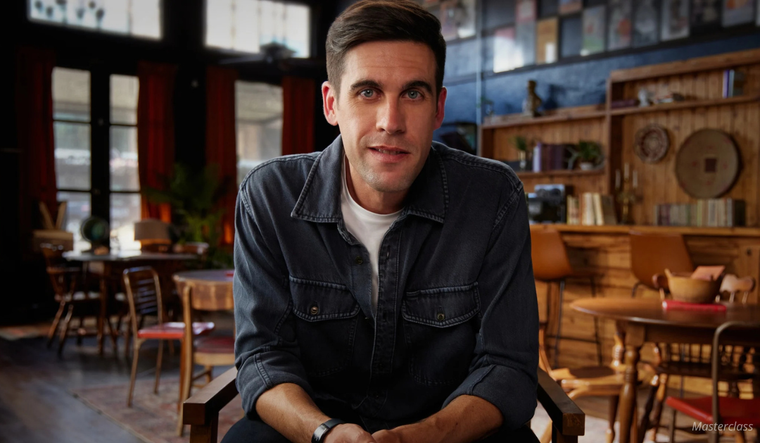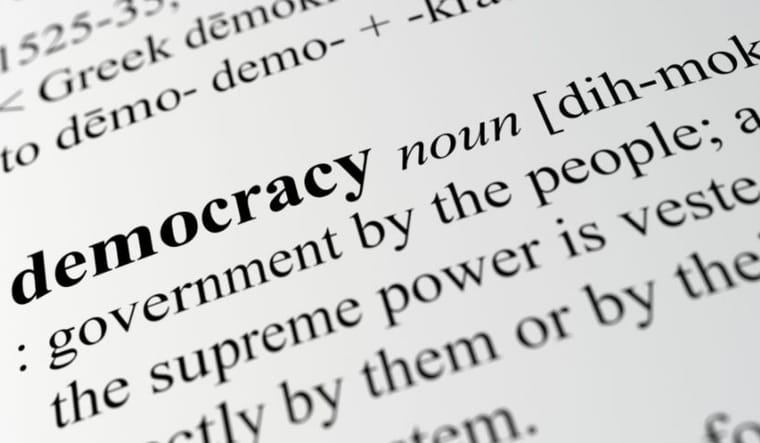Activist Ai-jen Poo Says Caregiving is Life and All of Us Need to Think About It, No Matter Our Age
We are in a care crisis. Millions of Americans must choose between taking a parent to an appointment or going to work. Others face leaving their careers because childcare is too expensive. Meanwhile, millions who work in the caregiving industry—one of the fastest-growing and most essential industries—are paid extremely low wages. As Ai-jen Poo says, "The numbers just don't add up."
As the president of the National Domestic Workers Alliance and the executive director of Caring Across Generations, Poo advocates for caregivers day in and out, fighting to bring affordable care to every person and family that needs it. She also sheds critical light on care at large, showing us how this is the most vital conversation we must be having right now—for our well-being at home and that of our economy.
Because if we don't have care, what then do we have? Care—given and received—is essential. We chatted with Poo this week to go deeper and learn how we can all advocate for a new framework that cares about care.
A CONVERSATION WITH AI-JEN POO
Starting with the big picture and considering care at large in the US and the profound systemic need for more support around cars, what is at the top of your mind right now?
In the long arc of the history of caregivers and people who rely on care, I feel convinced that we are the generation that will deliver real change in our policies and culture to support caregiving. Coming out of the pandemic, there was an awakening that we—as individuals and as individual families—can do everything in our power to care for the people we love, and it still might not be enough because of how we have structured our society. It means we need systems, programs, and a strong workforce to support us, and I think we've started making real progress in that direction. Having a candidate like Kamala Harris created even more visibility and a sense of Wow, this thing that I'm experiencing as a personal crisis, and a personal failure sometimes, is actually a societal-wide challenge that there are solutions for.
My hope is that the caregivers who feel connected to the momentum we've been building don't give up hope and continue to help other caregivers connect the dots to solutions that are possible. I think so many of us have been struggling in isolation for so long that we don't think change is possible, or we don't know that there are solutions that could actually offer real relief and real support to us, but they do exist. So, I want to make sure that we as caregivers remind each other of that and help each other break out of the isolation, which could potentially get much worse in the coming years, and to remind everybody that it doesn't have to be this way. There are solutions, and we can enact different choices to support caregivers in our country.
Some profound statistics about caregiving are making headlines, such as 23 percent of US adults are sandwich-generation caregivers. But what are some aspects of caregiving that you feel warrant more awareness and conversation around?
People don't generally think about the caregiving conversation as a conversation about the economy, and that part is so important. Understanding that having access to care, whether it's childcare, senior care, or disability care, is an essential input for our workforce, which is powered by people who are part of families. If we don't have the right infrastructure and systems in place and people are left on their own, we are left in a situation that is not sustainable for anyone. Families can't afford to pay more, the costs keep rising, and workers can't afford to be paid less, and they're already trapped in poverty if they choose to stay as care workers, working in child care or senior care. So, seeing that this is an economic concern is important. It concerns working-class and middle-class families so directly because these groups work hard every day—and the numbers just don't add up. They cannot afford essential care for their loved ones and stay in the workforce because their wages aren't enough. Also, for many of the programs that are available, like Medicaid for home care, you have to completely spend down your assets to be eligible for direct care. A lot of the childcare subsidies require that you be essentially living in poverty. So, if you're doing what everybody wants to do, which is work and have a dignified job, you're at a disadvantage in our current system. So this is an economic issue, and investing in accessible quality care for working people and families is a huge part of what we need for the future if we want an economy where we meet the needs of middle-class and working-class people.
Also, the workforce of care workers is still invisible when they are among the fastest-growing workers in our economy because of the huge demand. Home health care workers, personal care aides, care attendants—these job categories are within the top five fastest growing occupations in our economy because of the growing aging population.
Will you talk more about the invisibility and often lack of value around care positions? Do you see a shift in how society views these essential positions?
I do. We started seeing care workers as essential workers during the pandemic, which felt like a shift. But there are still two challenges. One is that the work has always been seen as less-than-skilled work. We still don't have a national training standard for home care workers, so there's this assumption that anyone can do it, and the work is devalued in that sense. Then there's also this challenge when we think of the archetype of a working-class hero; it's often a man in a hard hat or in a factory when the truth is the key archetype is a woman of color in scrubs. If we were to be real about who the working class is, it's a lot of different faces in many different sectors that we don't culturally draw up as the backbone of our economy. These are jobs that are job-enabling jobs. They're at the foundation of our entire economy. I don't think we're there yet to really understand how investing in those workers and jobs as good jobs for the future has this incredible ripple effect throughout the entire economy of strengthening the dignity and quality of work for everybody.
What you've been talking about touches on the wider truth of how care, in some form, touches every person. No one is immune to needing care, just as most people aren't immune to giving care at some point.
It is such a profound role that we have in our lives as people who provide care and people who rely on the care of others. It's almost like we could turn things inside out if we focused our thinking about and planning for the future from that place of how important it is to support that role.
Election-aside, we are constantly told that we are different from each other and divided and that we live in a zero-sum world with winners and losers. Actually, the truth is that we're all caregivers and people who need care, and this need is the most important unifying aspect of our lives. I think it could bring us together in ways that are essential for the future of the country and our families if we can find a way to support each other and give future generations a different set of choices. Right now, we don't really have choices. Often, it's: Do you go to work to pay the bills to support your family, or do you stay home because the care bills are too high? That's not a real choice. And then the stressors of not having the right support while you're working for somebody who is struggling with Alzheimer's, Dementia, or any number of chronic illnesses that are becoming epidemics in our country. It is this simmering crisis that if we addressed together, it could be so healing. That is what gives me hope: I refuse to believe that this is not a majoritarian issue, something that at every single kitchen table in America, we could have a real, meaningful, and profound conversation about. And that that conversation in and of itself would have important meaning for our sense of who we are as a country and what unites us.
We wanted to ask you where we should start—both as individuals and as families on an intimate level—to help push forward the topic of care. Having these conversations at our own tables is a place to start.
Exactly, and when it's not a heightened time of crisis. An election year is almost the worst time to be knocking on people's doors because it feels so transactional. In reality, we should be knocking on each other's doors year-round, just having conversations about our hopes and dreams for each other and for the future. With the care conversation, that is something we should be having now in an intergenerational way with young people and people of all ages: How do we support the sandwich generation? How do we bring attention inside our own families to the different roles we will each play in the caregiving equation? How do we support each other in all that? Just starting that conversation is important, and it doesn't have to be dark. In fact, it can be so invigorating to be like, 'Wait, we can actually have a plan!' Maybe if we get into the habit of having a plan around care for our families, we can actually have a conversation about the plan for our country.
If you'd like to get involved in moving forward the conversation around care, visit:
Caring Across Generations: "People can get involved in their states and sign up for regular actions and events," says Poo. "We have a fellowship program for caregivers."
National Domestic Workers Alliance: Poo and her team are working in states to raise wages for care workers and "to build coalitions to make Child Care paid leave and Senior and Disability care more affordable and accessible at the state level," she says.
Ai-jen Poo is a labor leader, award-winning organizer, author, leading voice in the women’s movement, and nationally recognized expert on elder and family care. She is the President of the National Domestic Workers Alliance, Director of Caring Across Generations, Co-Founder of SuperMajority and Trustee of the Ford Foundation. She is the author of the celebrated book, The Age of Dignity: Preparing for the Elder Boom in a Changing America.
Please note that we may receive affiliate commissions from the sales of linked products.



